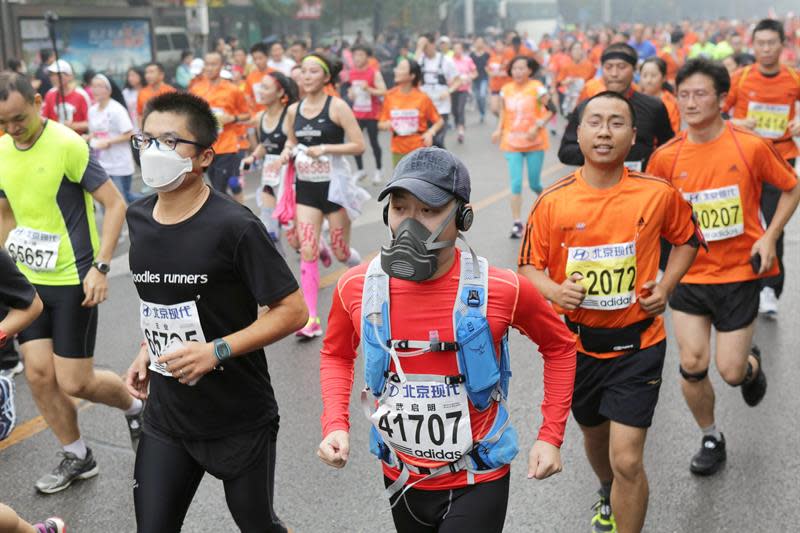Smogathon: Beijing Marathon held despite 'hazardous' air quality
Running a marathon is hard enough; in polluted air, it's dangerous

More than 30,000 people took part in Sunday's Beijing Marathon, according to its organizers. But with some runners wearing protective masks and race officials handing out 140,000 sponges “to clean skin that has been exposed to smog," backlash has been growing over the decision to hold the event in the toxic haze.
According to the South China Morning Post, Beijing’s Air Quality Index — which measures micrograms per cubic meter of fine particulate matter — topped 400 on Sunday, well above the 300 "hazardous" threshold officials say poses a health risk and usually indicates people should "avoid prolonged or heavy exertion."
“They are trading their lives for the run,” one user wrote on Weibo, China's largest social media platform, according to the paper.
"Why didn't marathon organizers cancel this morning's race?" - @willphilipps "Obvious health risk for all involved" pic.twitter.com/WY80wczMAh
— That's Beijing (@Thats_Beijing) October 19, 2014
“Why not change the date for the Beijing marathon?" wrote another. "Thousands of people gasping for bad quality air — is this keeping fit or ruining [their] health? In case of bad weather, no matter how important the race is, it should be cancelled. If no days with suitable weather can be found, [it means that] the city does not deserve to hold any major sporting events that involve public participation."
At no point should a marathon ever look like this. #BeijingMarathon #Pollution #Airpocalypse pic.twitter.com/kv5JoALshB
— Adrian Sandiford (@asandiford) October 19, 2014
"Actually, on a normal day, nobody would run in such conditions," Liu Zhenyu, another runner, told The Associated Press. "But the event is happening today, so what can we do?"
Organizers said it was impossible to reschedule, because nearly half the 30,000 participants were from other cities or abroad.
The Beijing marathon. I can't think of any jokes. http://t.co/b7RnvWYtjr pic.twitter.com/h7gjJtog3z
— Chris Buckley 储百亮 (@ChuBailiang) October 19, 2014
Ethiopia's Girmay Birhanu Gebru won Sunday's smog-filled race in 2 hours, 10 minutes and 42 seconds, while his compatriot, Fatuma Sado Dergo, took the women's title.
Others participants, like British runner Chas Pope, did not finish.
Ran 10K of the Beijing Marathon (in a mask) in hazardous air conditions then abandoned it. @iaaforg #Airpocalypse pic.twitter.com/9waLpuSymn
— Chas Pope (@china_chas) October 19, 2014
Pope completed just 6 miles of the 26.2-mile race in a mask before he was forced to pull out.
Mask before and after running 10K of #BeijingMarathon in hazardous air - glad not in lungs @totobobo #Airpocalypse pic.twitter.com/XVAMCJMdXF
— Chas Pope (@china_chas) October 19, 2014
While some finishers complained of the conditions, there were no immediate reports of serious health problems.



